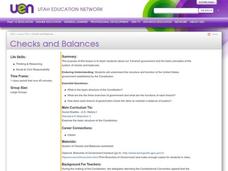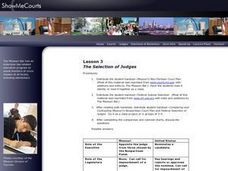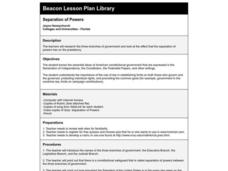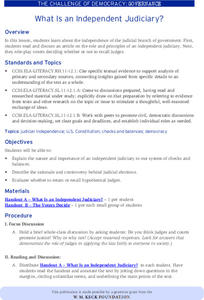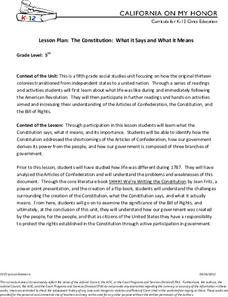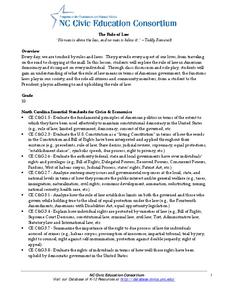Curated OER
Checks and Balances
Eleventh graders explain the structure and function of the United States government established by the Constitution. They set up a make-believe scenario: the 3 volunteers have been friends for a long time and have formed a club (the...
Curated OER
The Selection of Judges
Students analyze documents to determine the steps taken in the selection of judges.
Curated OER
Lesson 2: The Constitution: Our Guiding Document
Explore the structure and content of the US Constitution in the second lesson of this five-part social studies series. A collection of activities, games, and videos complement a class reading of a document summarizing the US...
Curated OER
Justice Is Blind, Colorblind That Is
It's so interesting to see kids respond to articles about education. To start the day, prompt learners to discuss the words colorblindness and diversity. Then, split your class in two and have one side read an article from 2007 and the...
Curated OER
The U.S. Constitution Power Grab Game
Students study the powers and limitations of the three branches of the American government. They explain how the system of "checks and balances" protects the individual citizens. They explain how the amendments to the Constitution...
Curated OER
Separation of Powers
Eighth graders research the three branches of government and examine the effect that the separation of powers has on the presidency. They explain the importance of the rule of law in establishing limits on both those who govern and the...
Ohio Center For Law-Related Education
Four Activities: Thurgood Marshall and the Nomination and Confirmation of Federal Judges
The process of nominating and confirming federal judges can sound like a lot of bureaucratic hoops, but a resource breaks down the steps of the Supreme Court nominations in a simpler manner. Learners participate in four activities that...
Curated OER
3 Branches of State Government
Fourth graders discuss what they think of when they hear the word government and write their suggestions on the board. They discuss what the state government is and what it does. They then discover the three separate branches of...
Curated OER
Senate Judiciary Committee Confirmation Simulation
Students research the Supreme Court judicial selection process while role playing. They examine the political nature of the process and discuss merits of Supreme Court nominees.
Curated OER
US Government: The Constitution
Students explore the branches of government. In this U. S. Constitution lesson, students examine the system of checks and balances in the U.S. plan of government as they read the document and define vocabulary words.
Curated OER
3 Branches of Governement
Sixth graders use the "Making the Grade" books, citizenship packets, and the "Ben's Guide" website to create a poster and a report on their assigned government branch. They then present their poster and report to their classmates.
Curated OER
Ohio Statehouse History
Fourth graders examine the history of the Ohio Statehouse and order the major historical events in its development. The instructional activity traces the development from the time of Ohio's vast wilderness to the house's completion in 1861.
Curated OER
Civics: Missouri's Non-Partisan Court Plan
Students examine the ways that the Missouri Non-Partisan Court Plan helps the court maintain a system of separation of powers and checks and balances. After discussing the principle of judicial impartiality, they complete a chart...
iCivics
Governing Communities
The government at the local level acts as perhaps one of the most relevant government systems to many in their communities. Learners discover how the local government shapes their lives and the similarities and differences between the...
Judicial Learning Center
The Federalist Papers and The Federal Judiciary
Pupils work in groups or as individuals to read about and then discuss the Federalist Papers. To finish, they write essays about an assigned topic dealing with the Federalist Papers and the federal judiciary.
Judicial Learning Center
How to Create a Law
Laws affect everything from a scholar's favorite public park to rules in the classroom. Express the importance of lawmaking and teach how they relate to every facet of life with a resource on how a bill becomes a law.
Constitutional Rights Foundation
What Is an Independent Judiciary?
While justice is supposed to be blind, it doesn't always follow the rules. Using a reading on the independent judiciary and case studies, learners consider what to do with judges who rule in their own self-interest rather than on behalf...
C-SPAN
Choice Board: Expressed and Implied Powers
Article 1, Section 8 of the United States Constitution expressly lists powers given to Congress. Over the years, lawmakers have expanded the enumerated powers to include powers implied by the list. To better understand the significance...
Curated OER
American History Through the Len of the Supreme Court Decisions
Students examine the historical background of Supreme Court decisions and the basic principles behind legislation. As part of the lesson, students discover legal concepts and terms and write sentences using the vocabulary they have...
Curated OER
From Classroom to Courtroom: The Children of Supreme Court Justices
Students choose one of the Supreme Court justices and research their life as a child from birth to age 21. They identify a list of topics that related specifically to youth that this judge may have a vested interest in.
Judicial Learning Center
About Federal Judges: Qualifications of Judges
"Help Wanted: A Supreme Court Justice." What should be included in the ad? Learners ponder the question during a lively activity that asks them to examine the qualifications for various federal offices and then create job postings....
Judicial Branch of California
The Constitution: What It Says and What It Means
Learners get the chance to act as representatives to the Constitution Convention, and must decide whether or not to recommend your state ratify the new framework. After examining the Constitution line-by-line, they consider their...
C-SPAN
14th Amendment Equal Protection Clause
Two Supreme Court cases, Plessy v. Ferguson and Brown v. Board of Education take center stage in a lesson about the Equal Protection Clause of the 14th Amendment. Class members research both cases to compare and contrast the rulings.
Carolina K-12
The Rule of Law
What functions do laws serve in our society? Your learners will be guided through several interactive activities to address this question, and to consider the impact of rule of law in American society.


